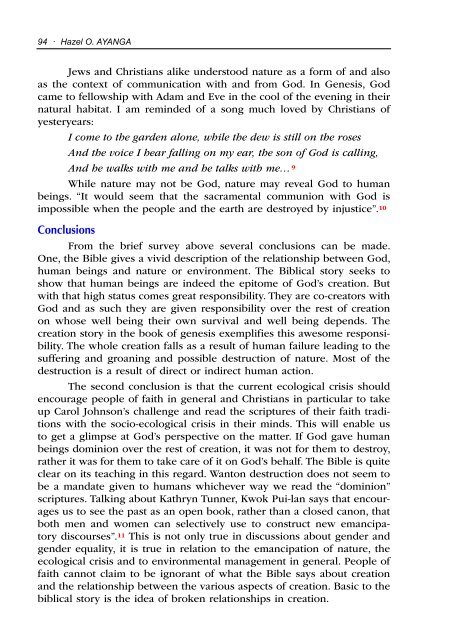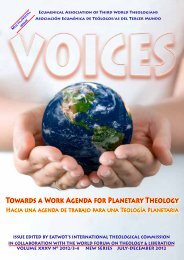voices-2013-2&3 - EATWOT's International Theological Commission
voices-2013-2&3 - EATWOT's International Theological Commission
voices-2013-2&3 - EATWOT's International Theological Commission
Create successful ePaper yourself
Turn your PDF publications into a flip-book with our unique Google optimized e-Paper software.
94 · Hazel O. AYANGAJews and Christians alike understood nature as a form of and alsoas the context of communication with and from God. In Genesis, Godcame to fellowship with Adam and Eve in the cool of the evening in theirnatural habitat. I am reminded of a song much loved by Christians ofyesteryears:I come to the garden alone, while the dew is still on the rosesAnd the voice I hear falling on my ear, the son of God is calling,And he walks with me and he talks with me… 9While nature may not be God, nature may reveal God to humanbeings. “It would seem that the sacramental communion with God isimpossible when the people and the earth are destroyed by injustice”. 10ConclusionsFrom the brief survey above several conclusions can be made.One, the Bible gives a vivid description of the relationship between God,human beings and nature or environment. The Biblical story seeks toshow that human beings are indeed the epitome of God’s creation. Butwith that high status comes great responsibility. They are co-creators withGod and as such they are given responsibility over the rest of creationon whose well being their own survival and well being depends. Thecreation story in the book of genesis exemplifies this awesome responsibility.The whole creation falls as a result of human failure leading to thesuffering and groaning and possible destruction of nature. Most of thedestruction is a result of direct or indirect human action.The second conclusion is that the current ecological crisis shouldencourage people of faith in general and Christians in particular to takeup Carol Johnson’s challenge and read the scriptures of their faith traditionswith the socio-ecological crisis in their minds. This will enable usto get a glimpse at God’s perspective on the matter. If God gave humanbeings dominion over the rest of creation, it was not for them to destroy,rather it was for them to take care of it on God’s behalf. The Bible is quiteclear on its teaching in this regard. Wanton destruction does not seem tobe a mandate given to humans whichever way we read the “dominion”scriptures. Talking about Kathryn Tunner, Kwok Pui-lan says that encouragesus to see the past as an open book, rather than a closed canon, thatboth men and women can selectively use to construct new emancipatorydiscourses”. 11 This is not only true in discussions about gender andgender equality, it is true in relation to the emancipation of nature, theecological crisis and to environmental management in general. People offaith cannot claim to be ignorant of what the Bible says about creationand the relationship between the various aspects of creation. Basic to thebiblical story is the idea of broken relationships in creation.





